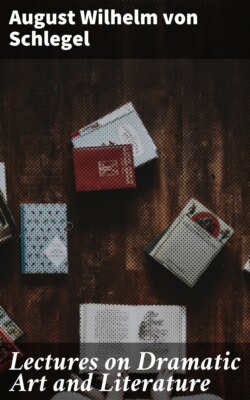Читать книгу Lectures on Dramatic Art and Literature - August Wilhelm von Schlegel - Страница 42
На сайте Литреса книга снята с продажи.
ОглавлениеIt has been often conjectured that the delivery of their dialogue resembled the modern recitative. For such a conjecture there is no other foundation than the fact that the Greek, like almost all southern languages, was pronounced with a greater musical inflexion than ours of the North. In other respects their tragic declamation must, I conceive, have been altogether unlike recitative, being both much more measured, and also far removed from its studied and artificial modulation.
So, again, the ancient tragedy, because it was accompanied with music and dancing, [Footnote: Even Barthélemy falls into this error in a note to the 70th Chapter of Anacharsis.] has also been frequently compared with the opera. But this comparison betrays an utter ignorance of the spirit of classical antiquity. Their dancing and music had nothing but the name in common with ours. In tragedy the primary object was the poetry, and everything else was strictly and truly subordinate to it. But in the opera the poetry is merely an accessory, the means of connecting the different parts together; and it is almost lost amidst its many and more favoured accompaniments. The best prescription for the composition of an opera is, take a rapid poetical sketch and then fill up and colour the outlines by the other arts. This anarchy of the arts, where music, dancing, and decoration are seeking to outvie each other by the profuse display of their most dazzling charms, constitutes the very essence of the opera. What sort of opera-music would it be, which should set the words to a mere rhythmical accompaniment of the simplest modulations? The fantastic magic of the opera consists altogether in the revelry of emulation between the different means, and in the medley of their profusion. This charm would at once be destroyed by any approximation to the severity of the ancient taste in any one point, even in that of the costume; for the contrast would render the variety in all the other departments even the more insupportable. Gay, tinselled, spangled draperies suit best to the opera; and hence many things which have been censured as unnatural, such as exhibiting heroes warbling and trilling in the excess of despondency, are perfectly justifiable. This fairy world is not peopled by real men, but by a singular kind of singing creatures. Neither is it any disadvantage that the opera is brought before us in a language which we do not generally understand; the words are altogether lost in the music, and the language which is most harmonious and musical, and contains the greatest number of open vowels for the airs, and distinct accents for recitative, is therefore the best. It would be as incongruous to attempt to give to the opera the simplicity of the Grecian Tragedy, as it is absurd to think of comparing them together.
In the syllabic composition, which then at least prevailed universally in Grecian music, the solemn choral song, of which we may form to ourselves some idea from our artless national airs, and more especially from our church-tunes, had no other instrumental accompaniment than a single flute, which was such as not in the slightest degree to impair the distinctness of the words. Otherwise it must hare increased the difficulty of the choruses and lyrical songs, which, in general, are the part which we find it the hardest to understand of the ancient tragedy, and as it must also have been for contemporary auditors. They abound in the most involved constructions, the most unusual expressions, and the boldest images and recondite allusions. Why then should the poets have lavished such labour and art upon them, if it were all to be lost in the delivery? Such a display of ornament without an object would have been very unlike Grecian ways of thinking.
In the syllabic measures of their tragedies, there generally prevails a highly finished regularity, but by no means a stiff symmetrical uniformity. Besides the infinite variety of the lyrical strophes, which the poet invented for each occasion, they have also a measure to suit the transition in the tone of mind from the dialogue to the lyric, the anapest; and two for the dialogue itself, one of which, by far the most usual, the iambic trimeter, denoted the regular progress of the action, and the other, the trochaic tetrameter, was expressive of the impetuousness of passion. It would lead us too far into the depths of metrical science, were we to venture at present on a more minute account of the structure and significance of these measures. I merely wished to make this remark, as so much has been said of the simplicity of the ancient tragedy, which, no doubt, exists in the general plan, at least in the two oldest poets; whereas in the execution and details the richest variety of poetical ornament is employed. Of course it must be evident that the utmost accuracy in the delivery of the different modes of versification was expected from the player, as the delicacy of the Grecian ear would not excuse, even in an orator, the false quantity of a single syllable.
